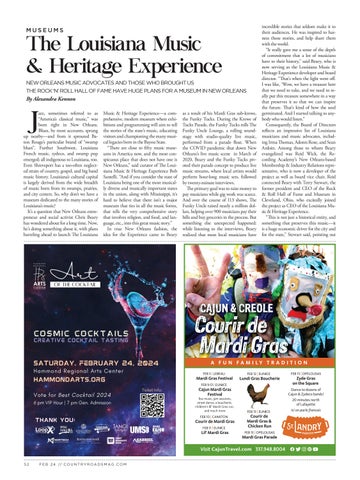MUSEUMS
The Louisiana Music & Heritage Experience
NEW ORLEANS MUSIC ADVOCATES AND THOSE WHO BROUGHT US THE ROCK 'N' ROLL HALL OF FAME HAVE HUGE PLANS FOR A MUSEUM IN NEW ORLEANS
By Alexandra Kennon
J
azz, sometimes referred to as “America’s classical music,” was born right in New Orleans. Blues, by most accounts, sprung up nearby—and from it sprouted Baton Rouge’s particular brand of “swamp blues”. Further Southwest, Louisiana French music, zydeco, and swamp pop emerged; all indigenous to Louisiana, too. Even Shreveport has a too-often neglected strain of country, gospel, and big band music history. Louisiana’s cultural capital is largely derived from the wide breadth of music born from its swamps, prairies, and city centers. So, why don’t we have a museum dedicated to the many stories of Louisiana’s music? It’s a question that New Orleans entrepreneur and social activist Chris Beary has wondered about for a long time. Now, he’s doing something about it, with plans barreling ahead to launch The Louisiana
52
Music & Heritage Experience—a comprehensive, modern museum where exhibitions and programming will aim to tell the stories of the state’s music, educating visitors and championing the many musical legacies born in the Bayou State. “There are close to fifty music museums in America now, and the most conspicuous place that does not have one is New Orleans,” said curator of The Louisiana Music & Heritage Experience Bob Santelli. “And if you consider the state of Louisiana being one of the most musically diverse and musically important states in the union, along with Mississippi, it's hard to believe that there isn't a major museum that ties in all the music forms, that tells the very comprehensive story that involves religion, and food, and language, etc., into this great music story.” In true New Orleans fashion, the idea for the Experience came to Beary
F E B 2 4 // C O U N T R Y R O A D S M A G . C O M
as a result of his Mardi Gras sub-krewe, the Funky Tucks. During the Krewe of Tucks Parade, the Funky Tucks rolls The Funky Uncle Lounge, a rolling soundstage with studio-quality live music, performed from a parade float. When the COVID pandemic shut down New Orleans’s live music scene in March of 2020, Beary and the Funky Tucks pivoted their parade concept to produce live music streams, where local artists would perform hour-long music sets, followed by twenty-minute interviews. The primary goal was to raise money to pay musicians while gig work was scarce. And over the course of 113 shows, The Funky Uncle raised nearly a million dollars, helping over 900 musicians pay their bills and buy groceries in the process. But something else unexpected happened: while listening to the interviews, Beary realized that most local musicians have
incredible stories that seldom make it to their audiences. He was inspired to harness those stories, and help share them with the world. “It really gave me a sense of the depth of commitment that a lot of musicians have to their history,” said Beary, who is now serving as the Louisiana Music & Heritage Experience developer and board director. “That's when the light went off. I was like, ‘Wow, we have a treasure here that we need to take, and we need to really put this treasure somewhere in a way that preserves it so that we can inspire the future. That's kind of how the seed germinated. And I started talking to anybody who would listen.” Consequently, the Board of Directors reflects an impressive list of Louisiana musicians and music advocates, including Irma Thomas, Adonis Rose, and Sean Ardoin. Among those to whom Beary evangelized was Reid Wick, the Recording Academy’s New Orleans-based Membership & Industry Relations representative, who is now a developer of the project as well as board vice chair. Reid connected Beary with Terry Stewart, the former president and CEO of the Rock & Roll Hall of Fame and Museum in Cleveland, Ohio, who excitedly joined the project as CEO of the Louisiana Music & Heritage Experience. “This is not just a historical entity, and something that preserves this music—it is a huge economic driver for the city and for the state,” Stewart said, pointing out
